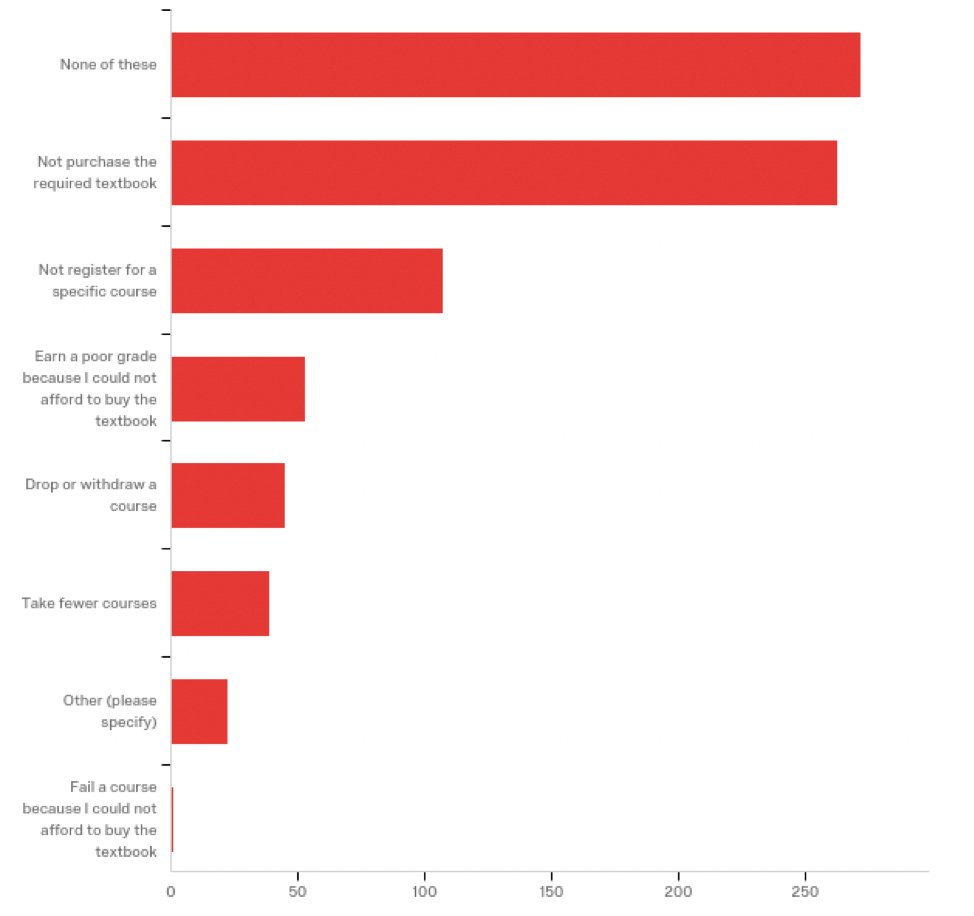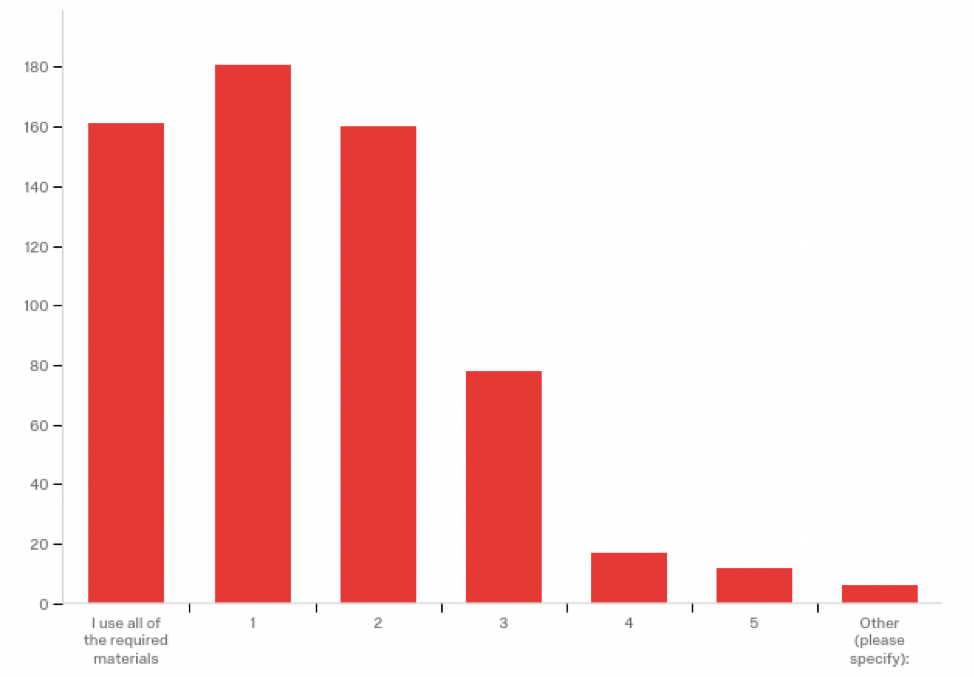Accessible Course Materials Survey
In March 2019, SGA created and administered a survey to all students asking about their experiences with buying and using textbooks as college students. Six-hundred sixty four (over 25% of) students responded to the survey, with representation balanced among class years and academic areas of the college. Seventy five percent of students report spending $299 or less per semester on books, with 35% spending between $100-$199. Most students reported spending less than $100 on additional non-textbook course materials, with art supplies most cited as the highest additional expense in this category. It was telling that 231 (60% of the respondents to the question) students expressed that they would be willing to contribute to a work group addressing affordable course materials at Skidmore.
The survey was an outgrowth of a college-wide committee that has been investigating the use of Open Educational Resources (OER) on campus. Open Educational Resources are educational materials designed and licensed to be freely available on a global scale. The committee expended its scope to include Affordable Course Materials (ACM), the ways in which educational materials can be offered at reduced prices or be included as part of subscriptions available through the library. In short, we are looking to reduce the overall cost of textbooks by utilizing a variety of resources.
Additionally, the faculty were surveyed concerning the variables they consider when selecting educational materials as well as their familiarity with and usage of OER. Eighty nine (over 25% of) faculty members responded. Of these faculty, approximately a third report intentionally using resources that are freely available to student through OER sources, photocopies, and books or journals available through the library; forty seven percent report having utilized OER in their classes. Quality and currency of the educational sources were the highest ranked in terms of importance in selecting course materials, and cost to the student was ranked as the second most important.
Three main themes are evident in the results of the student survey. First, the cost of textbooks and educational materials is on all students’ minds. Second, students are concerned about buying required texts that are not fully utilized – or not utilized at all. Third, students expressed frustration regarding the SkidShop’s textbook buy-back program.
- Overwhelmingly, students report that the cost of textbooks is an issue. Seventy-five
percent of students agree or strongly agree that the price of course materials negatively
affects their education.
- Ninety-nine percent of students report taking measures to reduce the cost of course materials, including buying used copies, buying from sources other than the bookstore, renting textbooks, buying digital copies, or finding free copies online (when possible).
- Thirty two percent of students report having not bought course materials due to their cost. Almost 20% report having either not registered for a course or withdrawn from a course due to the cost of course materials. Finally, 6% report having not been able to afford a textbook as a reason for having earned a poor grade in a course. One student wrote, “I've had to purchase a book until my next paycheck which caused me to fall behind temporarily.”
- Eighty four percent of students support further use of Open Educational Resources. According to one student, “Open source / public domain textbooks + reading material has literally helped me so much!!” Another student wrote, “As long as the OERs are the same quality as non-OER materials, I think they should be used. I would be willing to pay for a resource that's not OER if it's significantly better quality. Also, I know that many of the specific resources we've used for some of my classes are not available as OERs and I would hate for those great resources to be written out of the curriculum."
- Students expressed frustration regarding cases when the textbooks were only selectively
utilized in a course, or not at all.
- In the open-ended responses at the end of the survey, 15 of the 66 substantial responses concerned purchasing books that were not then utilized in the class.
- One student offered this perspective on paying for course materials, “If they are necessary then I don’t mind paying for them. What is really frustrating is the many classes I take where not only is there no assigned reading from the textbook but the teacher doesn’t even refer to it in class and that textbook never gets opened."
- Another student described a recent experience, “This semester I have had two professors switch a textbook on the syllabus out for another one after the list of required books was already sent out. Maybe sometimes this is necessary, but professors should consider the cost of students buying a book, returning it for a lower price, and then buying another book. It makes already expensive courses more expensive than they need to be."
- Yet another student expressed the sentiment, "It’s very frustrating when professors make you buy a really expensive textbook that you use literally ONE TIME.”
- Over 50% of students report purchasing one to two textbooks that they do not use each semester.
- In the open-ended responses, students expressed a great deal of frustration with the
SkidShop’s textbook buy-back program.
- One student expressed, “The price of text books is absurd. Additionally, the Skidmore bookstore’s buyback program is embarrassing and infuriating. If I buy a 40 dollar textbook, I expect the bookstore to offer me more than a dollar when I go to sell it back. It seems like the school is only caring about making money off the students in this respect."
- Another student offered that, "The Skidmore Shop doesn’t actually buy back all of the books it promises to and when it does it only gives you about 5$ for it if your [sic] lucky.... this should be made extremely clear when purchasing books from them and or please repay us a decent amount when returning our good condition books."
- Lastly, a student wrote, “It’s also frustrating when you buy a book from the campus store and return it in perfect condition and they’re like “we’ll pay you one dollar.””
Thank you to all the students who took the time to share their experiences with the cost of textbooks and other course materials here at Skidmore. The cost of textbooks is an important issue in higher education and is gathering international attention as publishing costs continue to rise. Our task force for affordable course materials initiatives continues to work to reduce the cost of course materials for Skidmore students, in particular those who are disproportionately burdened by these expenses.
Responses to the multiple-response question, “Has the cost of course materials ever caused you to do any of the following?”

Responses to the question, “In a given semester, how many required textbooks do you purchase but not use?”

